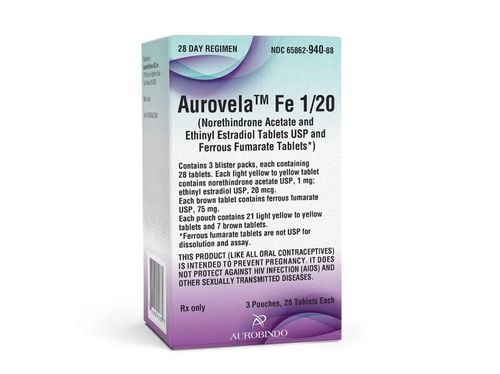This is an automatically translated article.
The article was consulted with Specialist Doctor II Pham Thi Tuyet Mai - Obstetrician and Gynecologist - Department of Obstetrics and Gynecology - Vinmec Hai Phong International General Hospital.Perimenopause is a time when the hormones in the body begin to decline, affecting the health and physiology of women. So determining how often perimenopause in women begins and how early perimenopause is will help women recognize this stage early for timely improvement.
1. What is perimenopause?
Perimenopause is the period before menopause in a woman, when the female hormone estrogen is greatly reduced causing the first symptoms of perimenopausal disorders.
Perimenopause is the period before a woman's menopause. In perimenopausal women, there will be changes in estrogen and progesterone levels - two female hormones produced in the ovaries. At this stage, ovarian activity begins to decline and there is an imbalance of female hormones that makes menstruation irregular and lasts for many days. Hormonal changes can lead to symptoms such as hot flashes, vasomotor disturbances, etc., which can last many months or years after a woman has not had a period. During this time, a woman's menstrual cycle may be disrupted - her period will be missed for a while and then it will come back.
If you have not had a period for more than 12 months (except in cases after childbirth), you are most likely going through menopause. Most women have to go through a period before menopause called perimenopause, with many changes in both reproductive function and psychology, causing many troubles for the woman herself as well as her family. .
Perimenopause is a natural law that is hard to avoid. Along with the decline in female hormones, the amount of free radicals is also born at a stronger rate, causing comprehensive aging in women. At that time, women will face degradation in beauty, physiology and health.
Trắc nghiệm: Sự hiểu biết của bạn về kinh nguyệt
Kinh nguyệt có vai trò quan trọng đối với sức khỏe sinh sản, do đó nữ giới cần chủ động trang bị kiến thức để theo dõi và kiểm soát tình trạng sức khỏe. Bài trắc nghiệm sau đây sẽ giúp bạn hiểu hơn về chu kỳ kinh nguyệt của bản thân.2. What is the age of perimenopause?
Usually, the time to start perimenopause in every woman is different because of each person's body type. However, according to statistics, most women face perimenopause when they are between the ages of 40 and 47.
The period of perimenopause is short or long depending on the hormones in each person's body. Some people only have to suffer this period for 2-3 years, but there are also people who have to struggle for 7-8 years.
The landmark that marks the end of perimenopause is when a woman enters menopause - determined after 12 consecutive months without a period. However, there are many cases where uncomfortable symptoms from perimenopause and health problems can continue to develop during menopause.

3. What is early perimenopause?
However, not everyone has the same age at menopause. Some people have early menopause, some people have late menopause, and there are people who are at normal age.
The normal age of perimenopause and known as the correct age of menopause is around the age of 50, perimenopause occurs about 2 - 5 years before. That is, perimenopause occurs at the age of 40 - 47 years. Early perimenopause is the pre-menopause that occurs before the age of 40. If a woman does not have a menstrual period at this age, this is called early perimenopause. Late perimenopause is perimenopause that occurs after the age of 60.
Considering early perimenopause alone, there is also an early aging or an early end of a woman's cycle. Premature perimenopause is a manifestation of premature aging of the sex organs and endocrine organs. After all, perimenopause occurs when there is a decline in female sex hormones. Low levels of two female sex hormones, estrogen and progesterone, have changed the body. This shows that there are abnormal changes in the body, especially on the reproductive organs. These unusual changes are not beneficial to the body. This means that early perimenopause can cause certain health effects.
The signs of early perimenopause are the same as those of a normal perimenopause, only they occur earlier, before age 40.
People with early menopause also face other risks. Most importantly, the risk of cardiovascular disease is much greater than that of people with normal menopause. Not only that, but they are also more susceptible to serious illness and more likely to die. They will also have an increased risk and severity of osteoporosis caused by early menopause. They will be the one to suffer from osteoporosis earlier, more severely and more prone to fractures than the average woman. Dental problems are also more common and cataracts can be very serious in some people.
4. Signs of perimenopause in women

Women can easily tell if perimenopause has "knocked" or not based on the following signs:
Menstrual disorders: When entering perimenopause, women will see their periods. her menstrual cycle becomes erratic, has no month or month, has less menstrual cycles, or even misses a period; menstrual bleeding becomes less; The number of menstrual days is prolonged,... Dryness, decreased libido: Premenopausal women often experience decreased libido, dry vagina, decreased pleasure and difficulty reaching orgasm, and the vaginal mucosa is dry and atrophy, prone to hurt or bleed easily. The decline in estrogen causes the vagina to dry, the amount of secretions to be less lubricated, and the elasticity of the "girl" also decreases. Hot flashes, or irritability: According to statistics, about 75% of premenopausal women suffer from erratic hot flashes ranging from mild to severe, accompanied by constant sweating, especially at night. Frequent problems with sleep: Many pre-menopausal women complain of difficulty sleeping, insomnia, poor sleep,... Melasma, dark spots, dry skin, and hair loss: When estrogen is reduced, the skin will become thinner, less elastic, dry and visible wrinkles. At the same time, melasma, dark spots, freckles also appear on the skin more. Besides, the hair gradually loses pigmentation and turns gray. The risk of cardiovascular and joint diseases: Decreased estrogen hormone increases the risk of cardiovascular and joint diseases by protecting the heart, preventing atherosclerosis, helping to bind calcium and skeleton. Anti-osteoporosis is the task of estrogen. Urinary tract infections: Women may notice signs of urinary tract infections such as frequent urination, frequent urination, pain when urinating, etc. Currently, Vinmec International General Hospital has a package of examination and consultation. pre-menopausal health care, helping customers to examine and consult with a gynecologist; perform tests to assess hormonal status; from there, early detection of perimenopausal diseases to have the most effective treatment.
Please dial HOTLINE for more information or register for an appointment HERE. Download MyVinmec app to make appointments faster and to manage your bookings easily.














